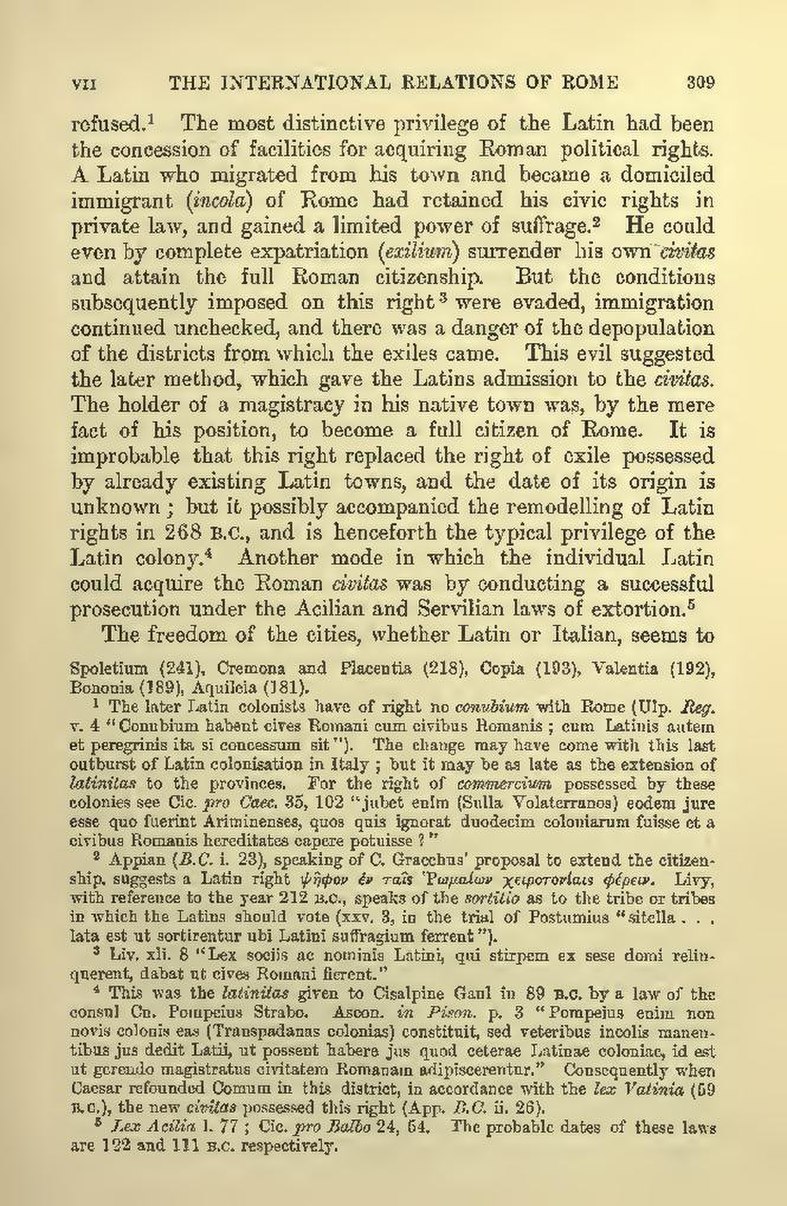refused.[1] The most distinctive privilege of the Latin had been the concession of facilities for acquiring Roman political rights. A Latin who migrated from his town and became a domiciled immigrant (incola) of Rome had retained his civic rights in private law, and gained a limited power of suffrage.[2] He could even by complete expatriation (exilium) surrender his own civitas and attain the full Roman citizenship. But the conditions subsequently imposed on this right[3] were evaded, immigration continued unchecked, and there was a danger of the depopulation of the districts from which the exiles came. This evil suggested the later method, which gave the Latins admission to the civitas. The holder of a magistracy in his native town was, by the mere fact of his position, to become a full citizen of Rome. It is improbable that this right replaced the right of exile possessed by already existing Latin towns, and the date of its origin is unknown; but it possibly accompanied the remodelling of Latin rights in 268 B.C., and is henceforth the typical privilege of the Latin colony.[4] Another mode in which the individual Latin could acquire the Roman civitas was by conducting a successful prosecution under the Acilian and Servilian laws of extortion.[5]
The freedom of the cities, whether Latin or Italian, seems to
- [Footnote: Spoletium (241), Cremona and Placentia (218), Copia (193), Valentia (192),
Bononia (189), Aquileia (181).]. Livy, with reference to the year 212 B.C., speaks of the sortitio as to the tribe or tribes in which the Latins should vote (xxv. 3, in the trial of Postumius "sitella . . . lata est ut sortirentur ubi Latini suffragium ferrent").]
- ↑ The later Latin colonists have of right no conubium with Rome (Ulp. Reg. v. 4 "Conubium habent cives Romani cum civibus Romanis; cum Latinis autem et peregrinis ita si concessum sit"). The change may have come with this last outburst of Latin colonisation in Italy; but it may be as late as the extension of latinitas to the provinces. For the right of commercium possessed by these colonies see Cic. pro Caec. 35, 102 "jubet enim (Sulla Volaterranos) eodem jure esse quo fuerint Ariminenses, quos quis ignorat duodecim coloniarum fuisse et a civibus Romanis hereditates capere potuisse?"
- ↑ Appian (B.C. i. 23), speaking of C. Gracchus' proposal to extend the citizenship, suggests a Latin right [Greek: psêphon en tais Rhômaiôn cheirotoniais pherein
- ↑ Liv. xli. 8 "Lex sociis ac nominis Latini, qui stirpem ex sese domi relinquerent, dabat ut cives Romani fierent."
- ↑ This was the latinitas given to Cisalpine Gaul in 89 B.C. by a law of the consul Cn. Pompeius Strabo. Ascon. in Pison. p. 3 "Pompeius enim non novis colonis eas (Transpadanas colonias) constituit, sed veteribus incolis manentibus jus dedit Latii, ut possent habere jus quod ceterae Latinae coloniae, id est ut gerendo magistratus civitatem Romanam adipiscerentur." Consequently when Caesar refounded Comum in this district, in accordance with the lex Vatinia (59 B.C.), the new civitas possessed this right (App. B.C. ii. 26).
- ↑ Lex Acilia l. 77; Cic. pro Balbo 24, 54. The probable dates of these laws are 122 and 111 B.C. respectively.
